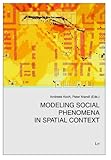Modeling social phenomena in spatial context editores: Andreas Koch, Peter Mandl
Tipo de material: TextoIdioma: Inglés Series Analíticas: Mostrar analíticasDetalles de publicación: Zürich, Germany Lit Verlag GmbH and Co. 2013Descripción: 150 páginas ilustraciones, mapas 24 centímetrosISBN:
TextoIdioma: Inglés Series Analíticas: Mostrar analíticasDetalles de publicación: Zürich, Germany Lit Verlag GmbH and Co. 2013Descripción: 150 páginas ilustraciones, mapas 24 centímetrosISBN: - 3643903456
- 9783643903457
- 304.2 M63
| Tipo de ítem | Biblioteca actual | Colección | Signatura topográfica | Estado | Código de barras | |
|---|---|---|---|---|---|---|
| Libros | Biblioteca San Cristóbal Acervo General (AG) | Acervo General | 304.2 M63 | Disponible | ECO010017638 |
Incluye bibliografía
Preface.. Agent-based modelling, spatial analysis, and geosimulation.. Estimating individual behaviour from massive social data for an urban agent-based model.. Modeling aspects of human behaviour in a multi-agent simulation.. Modelling a socio-technical transition towards 'flexible commuting behaviour'.. Changing climate, changing behaviour: modeling housing markets responses.. Can Naples ever be a litter free town? Simulating littering behavior using goal framing theory.. Multi-level simulation of farmer's land use and social organization decision-making; an agent-based approach.. Qualitative experiments as important integral part in transport and land use modelling .. Operationalization of households' decision-making about the energy concept and the heating system of dwellings.. Urban time and energy: an agent-based model simulating the effects of time structures on energy consumption in Vienna.. Applying the MAIA platform to model a manure-based energy system in the Netherlands.. Alternative scenarios of green consumption in Italy: an empirically grounded model.. Urban segregation revisited: incorporating cognitive space representations into agent-based residential models.. Distributed adaptability of infrastructures.. Field of study choice and migration: effects of social networks.. How to generate the daily passenger volume of an airport? A case study of Hamburg Airport.. Modelling maritime piracy: a spatial approach.. List of Authors
Human behavior and action is closely related to a corresponding social and spatial environment. The nature of relations in their structures, functions, and temporal domains is characterized by a duality of contexts, an interrelatedness of the individual and local with the social and global. Causes, influences, and effects are mutual - and this at different scales. This book presents approaches that deal with interactions within and between the social and spatial realm, focusing on human behavior, land use change, and energy and infrastructure issues from an agent-based perspective. Inglés
